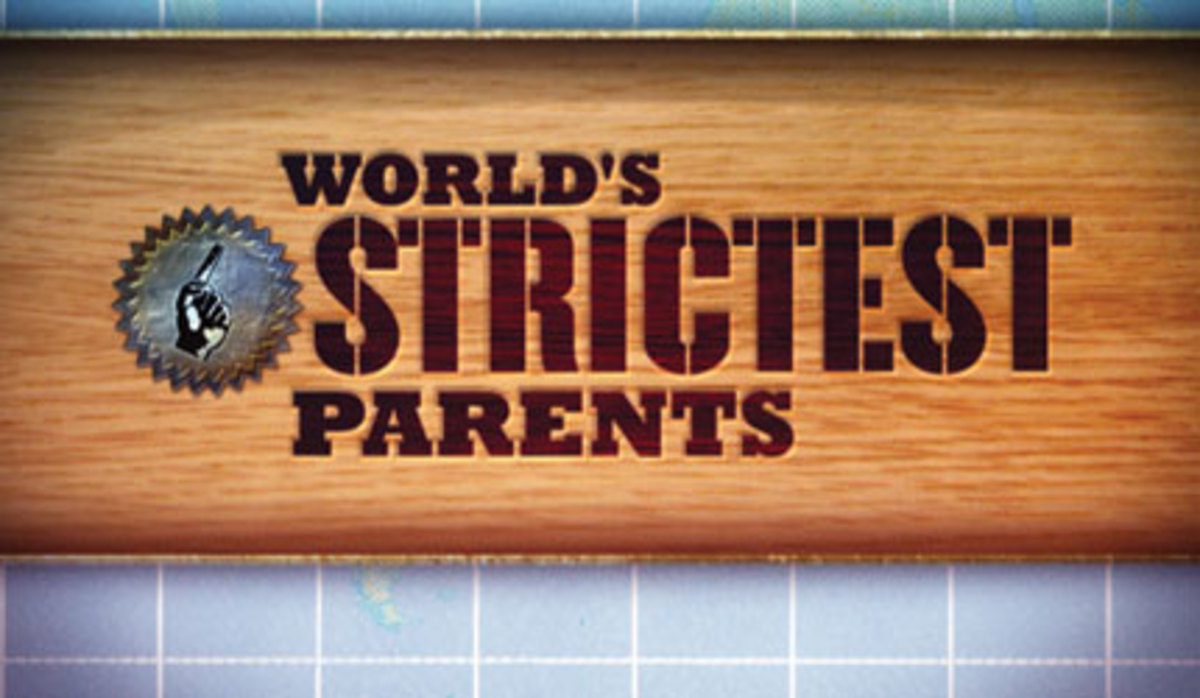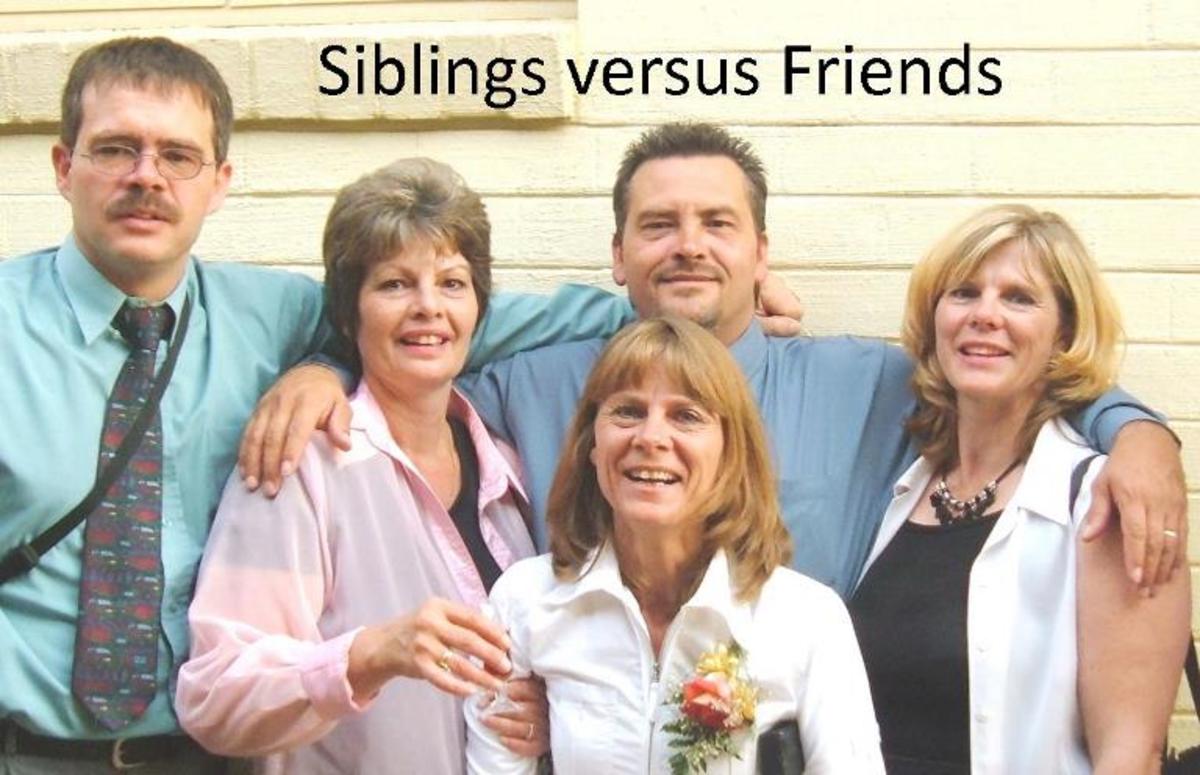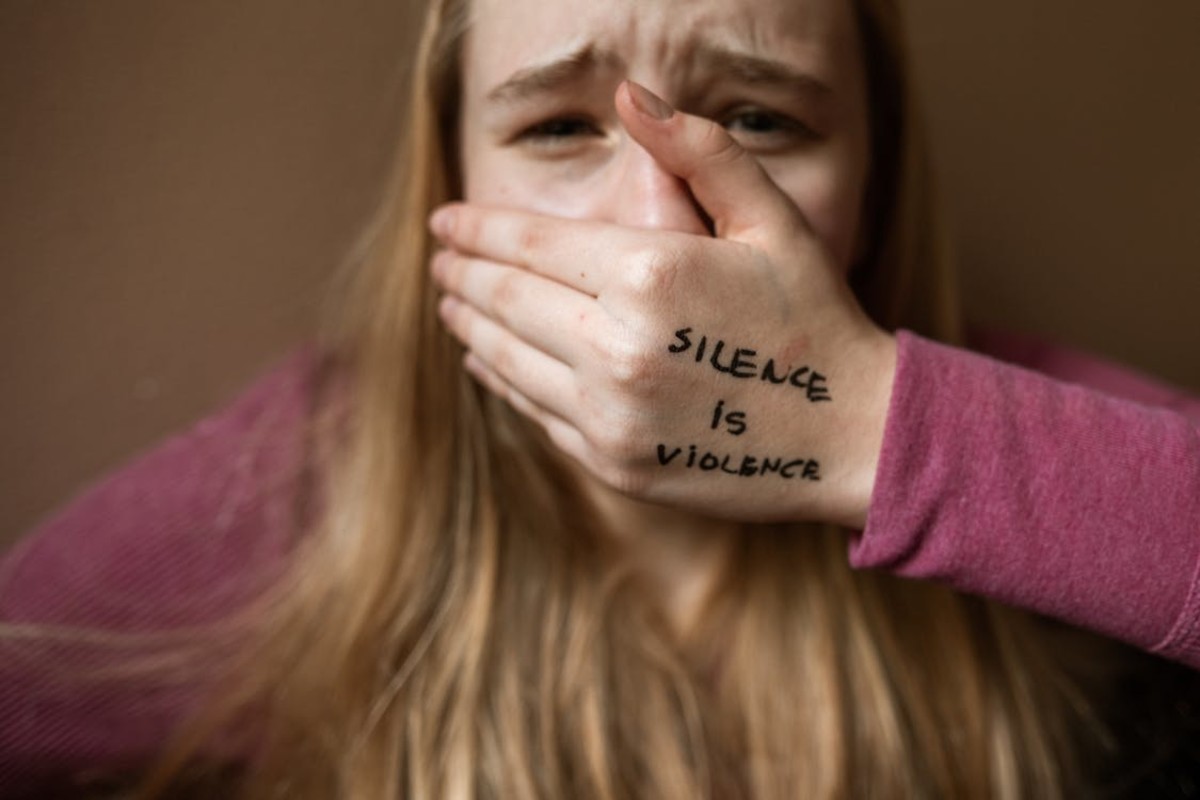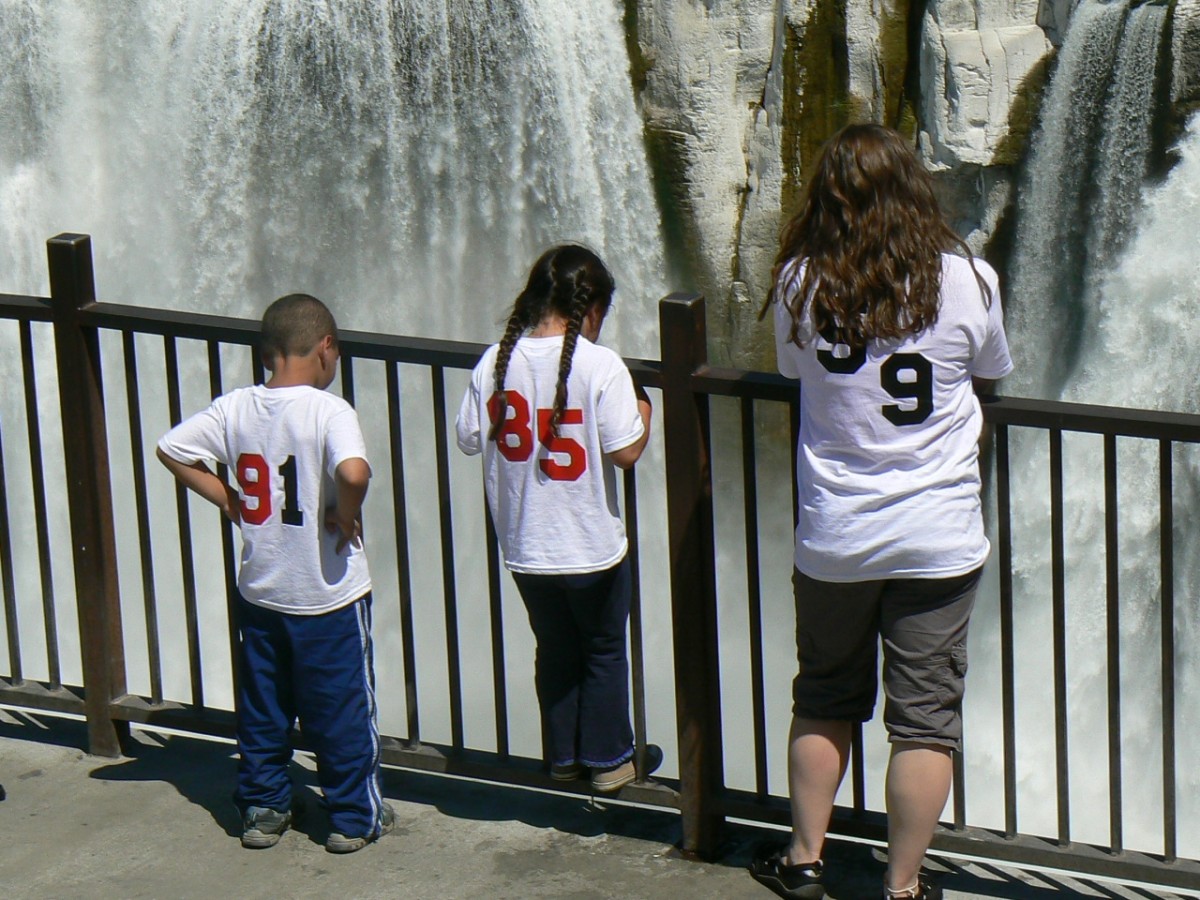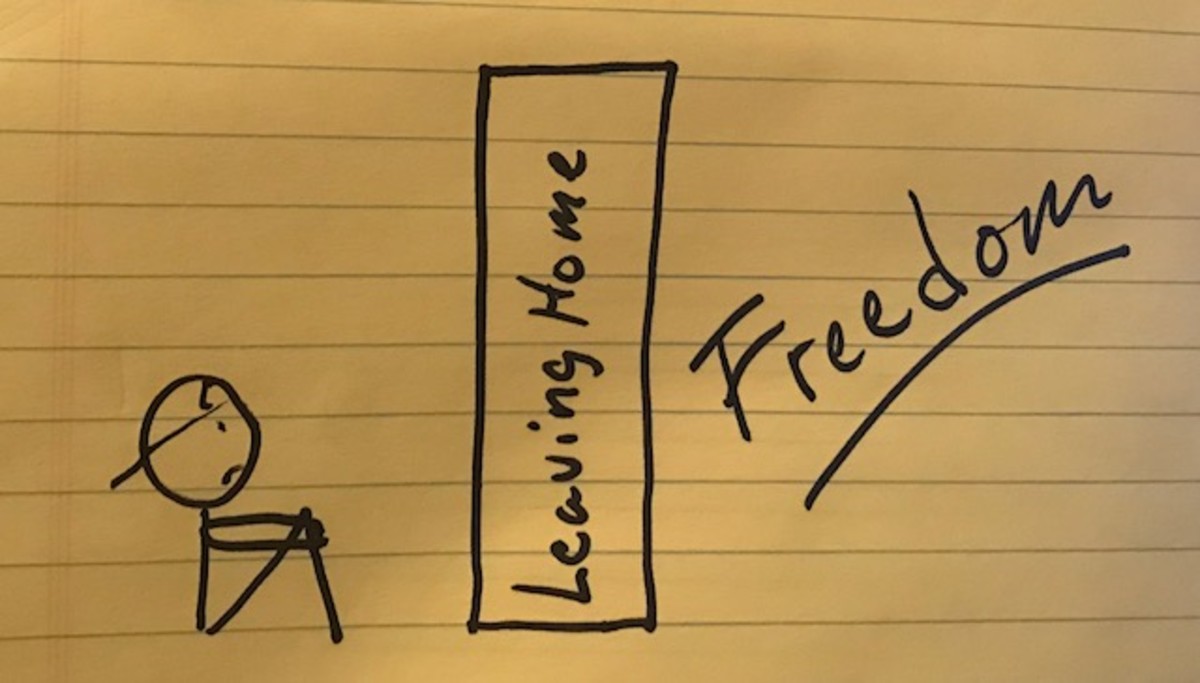- HubPages»
- Family and Parenting»
- Parenting Skills, Styles & Advice»
- Parenting Advice & Tips
Patty's June Newsletter - Sibling Rivalry (edited 2017).
Standing Friends Looking at Camera

Some Reasons Sibling Rivalry Makes Children Angry
Children get angry for the simplest reasons. For example, a little boy/girl gets angry because his mother spends too much time with her newborn. This child was the only child before the baby came which makes it difficult to receive the love she is accustomed to getting alone. This child may reciprocate her anger and start to act up resorting to being mental or cry excessively. Parents need to heed these warning signs and focus more on easing the pressure and learning how to make the child more comfortable at home. Even if away from home or when on an outing, these types of behaviors can occur unexpectantly abroad as well.
Parents have similar traits. A mother e.g. showed her anger with her children present when her boss made her redo her drawer at work because the balance was off. This mother was harsh and said some things that were not right to say in front of kids because of her anger. She relented and decided it was not worth the trouble making such a fuss. In the first place she concluded, it was not her fault, and in the second place, the woman was picking on her she reasoned. Parents who show violent emotions have a chance of passing those characteristic traits onto their children. What is advised is to think one is capable of reaching a higher plane and finding alternative solutions. A parent could turn the situation around after thinking things through and reasoning "It's not that bad after all. I just want it to go away".
Great Job! Keep It Up!

What's So Bad About Comparing Children's Attributes?
It's not precocious to describe how a sibling reacts when a parent tells a relative or friend how smart her child is at school. The parent brags about her child's accomplishments while the other children remain silent in the background. It's better when parents have something good to say about each of their children. This says one of two things. It says a parent cares about individualism, and a parent cares because they can help each child see that they have something of their own to work towards.
Children whose ages are too far apart and that make two separate families, depend more on each other for support in relationships.
Also, like the oedipal syndrome, fathers tend to expect more cooperation from their daughters and mothers from their sons because the saying applies here that male and female having trouble relating to each other, direct their attention to their opposite sex children. Of course that saying can work both ways based on the premise "you are more like me so I can relate my character traits with you". Parents expect success for the time and effort of developing attributes. The children who refuse to comply lose out; they carry around bad feelings toward their parents as well as their own self and might end up running away from home. (Please don't run away, it doesn't solve the problem). Eventually that child will face up to the problem either alone or with someone he trusts, hopefully not a stranger.
Parents can take the initiative and seek answers to their children's anger by relating to them upfront and personal. Parents can ask them questions to find out what their personal preferences are; their likes, dislikes, things that are bothersome, and ways to react according to 1) the people around them and 2) their environment. Sooner or later that child will respond; a firewall of defenses goes up while sensibilities that are on the rebound go down. If the child is competitive or not, anger, whether passive or aggressive, subsides because with progress, the emotion is limited; the other siblings are separated from what ails the problem child.
Young Girl Pointing At Her Friend

Don't Be A Tattle Tale
That's funny, who wants to tattle tale. What are the odds when tossing a coin, there is going to be a winner and a loser. Children like to tattle tale because it places the blame somewhere else. When children tell on siblings, it seems they have cleared themselves and they can watch the other sibling get in trouble. As children grow older, there is a line drawn on what to tell parents, especially since they themselves are doing more things, experiencing more opportunities to say and do things. Also, children drawn closer together are more protective of their siblings, not wanting them to get hurt. Siblings who stick together have an awesome time just trying to balance out their thoughts and fears. The heart of the matter is when all the siblings are participating in an activity or task, one child may wind up wanting to do it differently and has a slight chance of ending up with the short end of the stick. It's not easy to confirm that it's a group effort when one sibling does things differently and with different people, especially when growing up. And it's not always a bad thing to show your own way of doing things if done right. Besides, parents will allow the child to see, sooner or later, their own mistakes. If push comes to shove, seek an outside professional for therapy so that the family can stay together and on time.
On Crime
Philosophy which holds that complaining of {black} criminals is somehow betraying the race(54/55).
On The Word
Maybe it triggers an action that anytime something requires a commendation because of the word, it changes or reacts or changes...
Check On It
Denial that allows the abuse to continue.
Holding Hands Means Find Love And Adoration

Distribute Love Equally
Does anyone know a child who shows an overconfident mentality that says "You can't touch me because I'm doing everything right and therefore I'm solid. I'm secure".
A child with that much confidence has probably been given a lot of love from his/her parents. This child believes he can do anything, accomplish any task, has the brain to conquer all. Whether she's playing sports, making friends, doing homework, everything comes easy to her. This child feels loved and knows what it feels like to give love.
To be loved uniquely for one's own special skills is quite a blessing.
To not be- a less favored child can also receive her blessings. When a parent seeks out and acknowledges she's special and then "reflect the wonder of it back to her" she has a better chance sustaining if she fails.
Casting Roles
I know we have heard of role models and mentors, but what's up with casting children into roles? Casting children into roles is not something that we all would disagree with because we expect the oldest to be the responsible one. We expect the middle child to show some compassion, and the youngest to pursue her dreams. But what happens when a child is not happy with the things life gives her, or if she sees and wants more than what she is getting? She begins to demand her respect, disrespecting the persons who are authority figures like her teachers and parents. This child imagines she's not liked at school and acts out the bully role, gets stuck in this role, and does not know how to pull herself out of it. That child has to do something. She fought for what she believed in, now she must answer to her behavior.
That is not to say continue to accept what she does because children are testing authority, and acting out could be a cry for help. Maybe what she needs is advice, or some extra attention. Children need options, and grown-ups should not assume that things will work out by itself all the time. Take the time to nurture and guide her behavior, monitor TV time, read self help books, parenting role (be a role model), and make play time fun with other siblings. Children can be feisty and blame their failure on their other siblings. If bullying becomes a central issue, than other siblings will react when they get that age. No one likes to be locked in a role, be flexible and do activities that are both exciting and educational, especially to open up the lines of communication. Siblings do have to respect their sibling's space, and it's better and more peaceful when the space is occupied with each sibling doing what it is they each enjoy doing without harassment and malingering from their siblings. All in all, know that no one person is the problem, each needs to be accepted as they are, capable of growth and change, believing in own self, in each other, and supportive of each endeavor.
Can't Believe, What Is Happening?

Fighting Rules
How many people can honestly say they remember fighting with their siblings? I know while I was growing up, I was too busy playing sports and dolls with my brother to fight, nor did I blame everything that went wrong on my parents when I got mad or something happened that was not suppose to happen. You know how some children are about parents, "It was their fault, no doubt, my understanding was they were suppose to know what to do when things go wrong and fix things when they break down".
And I ran away from whippings. I am sure all are aware of the scripture "Spare the rod, Spoil the child". Well, my main motto was "do something wrong and don't get caught, cause you're going to get a whipping with that belt". I hated that belt, and my brothers hated it with a passion. But I finally decided that if one wants to make their parents happy, one is better able to do the things one likes to do, have more friends and be more successful at it. So, if I was fighting, I would not get my parents involved or as less as possible, unless the fighting was full blown hysteria.
Why kids fight? Perhaps tension make kids do things like "dealing with sexual feelings, boredom, taking it out on somebody else, something really upset them badly".
What to do when children fight? Separate them than ask what happened and let each one tell their side of the story. Let them know as a parent that it's understood and ask what they plan to do about it, then let them repair the breach.
Helping Hand

Jealousy Between Siblings
It's probably safe to say siblings are jealous of other siblings. Jealousy disguises itself because brothers and sisters like to compete with one another, with competition someone has to take first place. Jealousy between siblings after a competitive sport or whatever activity they choose to engage in, helps build lasting relationships. It also causes the doggedness of everyday normal fun to result in scrapes of emotional and physical degrees. Age differences between siblings do not matter much between seven through ten years old. As siblings grow, so does the mantra of feelings, there will be some jealousy because of the hormonal stage going on with adolescents and teenagers.
In her book Brothers & Sisters at Odds (1994) written by Elaine Landau, it tells us that the closer the ages, the more affection brothers and sisters have for each other. Same-sex siblings who share common interests can lead to healthy competition. Jealousy less likely will occur when siblings like each other, have some of the same goals and attributes. Another disguise that jealousy hides from is when a child is talented and appears to be better than the other siblings. Acting superior towards siblings can blind sight a talented child if jealousy persists.
A Healthy Relationship Among Siblings
It is what's needed in families because jealousy is good in some ways. Really, there is not much research about jealousy and sibling rivalry except that it allows siblings to want to know what makes each other tick. What makes my brother act so wild, or why does my sister wear so much make-up? Will these behavior antics cause my sister to be an outcast, or does politics really bring out the fiery in my brothers eyes? Squabbles and nicks and baby punches are tell tale signs of wanting to know.
The bad side of jealousy making is what's referred to as backstabbing, not finding that clique that most sisters have is an indication of sibling rivalry. Some siblings have it in for their siblings, not really intending to, it's just the way things are sometimes. Particularly, jealous is the sister whose role is so diverse and spread out so far as to cling onto a notion that does not air well with the family. For instance, a sister trying to be the Secretary of State when most family members in one household have not even graduated from college is quite rare. Competitive jealousy may very well send one on their way to reaching that goal.
Step-families: Friend Or Foe?
How sweet it is to find one self hiding behind the notion that "don't nobody like me" so they hang around the house gloating, having guilt feelings, and feeling sorry for themselves. Rather, siblings can muster the strength to support their step-siblings when they are not deprived of love from stepparents, and have a birth position whether from previous family or family that provides them comfort and security.
Many of the ideas presented in this newsletter comes from the book Brother & Sisters at Odds by Elaine Landau.
© 2017 Patty Florence

